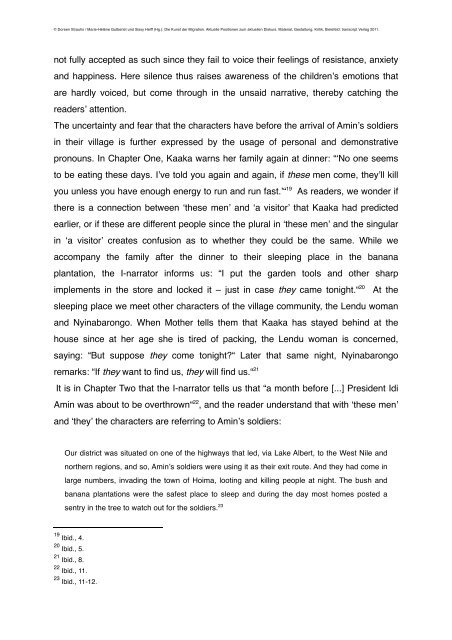Waiting – A Novel of Uganda at War - Migration & Media
Waiting – A Novel of Uganda at War - Migration & Media
Waiting – A Novel of Uganda at War - Migration & Media
You also want an ePaper? Increase the reach of your titles
YUMPU automatically turns print PDFs into web optimized ePapers that Google loves.
© Doreen Strauhs / Marie-Hélène Gutberlet und Sissy Helff (Hg.): Die Kunst der Migr<strong>at</strong>ion. Aktuelle Positionen zum aktuellen Diskurs. M<strong>at</strong>erial, Gestaltung, Kritik, Bielefeld: transcript Verlag 2011.<br />
not fully accepted as such since they fail to voice their feelings <strong>of</strong> resistance, anxiety<br />
and happiness. Here silence thus raises awareness <strong>of</strong> the children’s emotions th<strong>at</strong><br />
are hardly voiced, but come through in the unsaid narr<strong>at</strong>ive, thereby c<strong>at</strong>ching the<br />
readers’ <strong>at</strong>tention.<br />
The uncertainty and fear th<strong>at</strong> the characters have before the arrival <strong>of</strong> Amin’s soldiers<br />
in their village is further expressed by the usage <strong>of</strong> personal and demonstr<strong>at</strong>ive<br />
pronouns. In Chapter One, Kaaka warns her family again <strong>at</strong> dinner: “‘No one seems<br />
to be e<strong>at</strong>ing these days. I’ve told you again and again, if these men come, they’ll kill<br />
you unless you have enough energy to run and run fast.’“ 19 As readers, we wonder if<br />
there is a connection between ‘these men’ and ‘a visitor’ th<strong>at</strong> Kaaka had predicted<br />
earlier, or if these are different people since the plural in ‘these men’ and the singular<br />
in ‘a visitor’ cre<strong>at</strong>es confusion as to whether they could be the same. While we<br />
accompany the family after the dinner to their sleeping place in the banana<br />
plant<strong>at</strong>ion, the I-narr<strong>at</strong>or informs us: “I put the garden tools and other sharp<br />
implements in the store and locked it <strong>–</strong> just in case they came tonight.“ 20 At the<br />
sleeping place we meet other characters <strong>of</strong> the village community, the Lendu woman<br />
and Nyinabarongo. When Mother tells them th<strong>at</strong> Kaaka has stayed behind <strong>at</strong> the<br />
house since <strong>at</strong> her age she is tired <strong>of</strong> packing, the Lendu woman is concerned,<br />
saying: “But suppose they come tonight?“ L<strong>at</strong>er th<strong>at</strong> same night, Nyinabarongo<br />
remarks: “If they want to find us, they will find us.“ 21<br />
It is in Chapter Two th<strong>at</strong> the I-narr<strong>at</strong>or tells us th<strong>at</strong> “a month before [...] President Idi<br />
Amin was about to be overthrown“ 22 , and the reader understand th<strong>at</strong> with ‘these men’<br />
and ‘they’ the characters are referring to Amin’s soldiers:<br />
Our district was situ<strong>at</strong>ed on one <strong>of</strong> the highways th<strong>at</strong> led, via Lake Albert, to the West Nile and<br />
northern regions, and so, Amin’s soldiers were using it as their exit route. And they had come in<br />
large numbers, invading the town <strong>of</strong> Hoima, looting and killing people <strong>at</strong> night. The bush and<br />
banana plant<strong>at</strong>ions were the safest place to sleep and during the day most homes posted a<br />
sentry in the tree to w<strong>at</strong>ch out for the soldiers. 23<br />
19 Ibid., 4.<br />
20 Ibid., 5.<br />
21 Ibid., 8.<br />
22 Ibid., 11.<br />
23 Ibid., 11-12.


